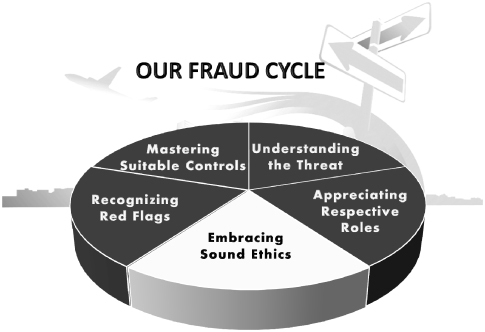11
Whistleblowing
As we have already said, this book is based around the Fraud Smart cycle, which covers five key aspects of helping non-specialists get to grips with fraud at work. This is repeated in Figure 11.1.
Figure 11.1 The Fraud Smart cycle.

This chapter sits within the third part of the Fraud Smart cycle, Embracing Sound Ethics, and covers the appropriate way for relaying concerns at work to ensure that they are properly addressed.
WHAT CAN GO WRONG?
Whistleblowing means different things to different people. Some see it as snitching on friends, while others feel it has something to do with going to the press to expose a scandal, and perhaps even being paid for this action. There is another view that whistleblowing involves telling officials about people who may have infringed some minor rule that has little value at all. If we fail to establish a sensible whistleblowing procedure, employees may become immersed in a culture of wrongdoing without being able to extract themselves.
We can consider how problems can arise by looking at three brief illustrative case studies taken from the UK and the USA. The first occurred in the public sector.
CASE STUDY
A whistleblower claimed that staff working for a local authority’s parking monitoring team had been dodging personal parking fines by cancelling them on the council’s internal computer system. The monitoring team deal with public ...

